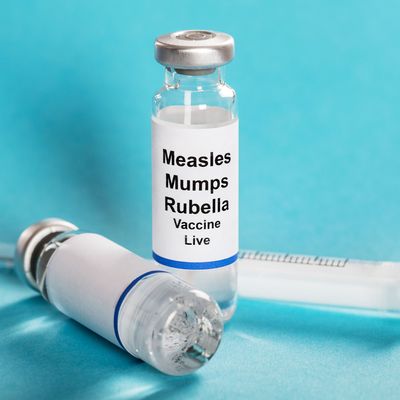
Washington state’s measles outbreak is becoming a major public-health crisis, as the number of confirmed cases has hit 50 — and that number will only continue to rise, public-health officials say, largely because the outbreak is happening in an area with low vaccination rates. Meanwhile, Texas is bracing for an outbreak of its own.
When Washington governor Jay Inslee declared a state of emergency on January 25, there were 26 confirmed measles cases. Per the Washington Department of Health, as of Tuesday evening, the are now 50 confirmed cases and 11 suspected cases, the majority of which are in Clark County, which borders Portland, Oregon. There is one case in King County, which happens to be the only reported adult case; though the details of how he caught the infectious disease have not yet been established, he reportedly traveled to Clark County not long before coming down with measles.
With the exception of the case in King County, the public-health crisis is affecting one worrisome age demographic: children. Per Clark County Public Health’s ongoing investigation, 34 of the cases are children between the ages of 1 to 10 years; 13 of the cases are of 11 to 18-year-olds; and just three of the cases are older than 19. The investigation also reveals what most of the cases have in common: Of the 50 people infected, at least 42 have not been immunized. (The vaccination statuses of the other cases have not been confirmed.)
Though Washington’s measles outbreak is the largest in the country, it isn’t the only state dealing with a public-health crisis. In the past two days, five cases of measles have been confirmed in multiple counties in southern Texas; of the cases, four are children under the age of 2. (What differentiates this outbreak from Washington’s is that per the Houston Chronicle, all four children had received their first of two measles vaccines.)
Many of the past major measles outbreaks over the past few years have occurred in under-immunized communities, in which parents don’t vaccinate their kids out of fear that vaccines cause autism — a link that has been thoroughly debunked. Indeed, the vaccination rates in Clark County have been especially low for years, per the county’s health office. (Washington and Oregon allow parents to opt out of vaccinating their children simply because they want to.)
“The bottom line is, there’s no surprise we’re seeing this right now,” Clark County health officer Alan Melnick told the Oregonian. “If we don’t get our immunization rates up, we’re going to see more of it in the future.”
Measles is a highly contagious and potentially deadly infectious disease that most often affects children, which is why doctors’ No. 1 recommendation to parents is to vaccinate their children. Per the CDC, one dose of the MMR vaccine is 93 percent effective at presenting measles, while two doses are 97 percent. Over the years, the number of annual cases has slowly been creeping up — a striking occurrence, given the disease was thought to have been “eliminated” in 2000. However, when measles hits one a community with low immunization rates, it spreads quickly: One person, on average, can infect between 12 to 18 others with the disease. Furthermore, 90 percent of susceptible individuals who come in contact with airborne droplets will become infected.
Since it’s so contagious, public-health officials in Washington expect the number of cases to increase. In an interview with NPR, Washington state epidemiologist Scott Lindquist signaled that this is only the beginning of the epidemic, as unvaccinated children will spread the disease in public places. (Health officials are investigating potential exposure sites, such as the Oregon Museum of Science and Industry.)
Though Clark County health officials are currently focusing on how to stop this current outbreak from spreading any further, doctors and the CDC are already looking toward the future and stressing the importance of vaccinations — especially against measles.
“It just seems such a shame that you have a disease that, if left unchecked, can rampantly spread, and yet you have a tool, a safe tool, a proven safe tool, that can stop it in its tracks,” Dr. Anthony Fauci of the National Institutes of Health to PBS. “That’s the evidence that we have got to get to people of why it’s so important to vaccinate yourself with a safe vaccine, which is the measles vaccine.”




